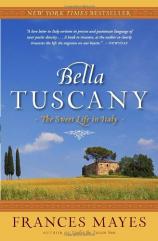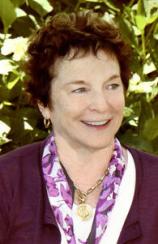Reading Group Guide
Discussion Questions
Bella Tuscany: The Sweet Life in Italy

1. Mayes writes, "It can be dangerous to travel. A strong reflecting light is cast back on 'real life,' sometimes a disquieting experience." What does she mean? How does travel change your perception of yourself? Has a hidden piece of your identity ever been revealed to you through travel?
2. While in Sicily, Mayes connects existential thoughts of death with traveling. "Why am I here where I don't belong? What is this alient place? I fell I'm in a strange afterlife, a haint blowing with the winds. I suspect the subtext to this displacement is the dread of death. Who and where are you when you are no one?" Do these thoughts of displacement enter your mind when you travel? Do you think they are connected to a fear of death?
3. How is Mayes's trip to Sicily different from her travels in Tuscany and the Veneto? What are specific traits of the Sicilian character? What in Sicily's history can account for these traits? Are there regional differences in your own country that are as vivid?
4. At one of the many extravagant feasts he attends throughout the book, Ed remarks, speaking of the bitter after-dinner drinks called amari, "Italians seem to have acquired more tastes than many of us." Do you agree? Why might that be the case? How is Italy's relationship to food different from that of other countries?
5. On a number of occasions, Mayes describes the many elaborate gestures Italians have for expressing how good food is. Do any of them make sense to you? How many gestures do you have to show your enjoyment of food? How often do you use these gestures? What does it mean to frequently express your appreciation of food through physical gestures? What does that say about a culture?
6. Why do you think Mayes includes recipes in her book? What is the effect of the recipes on you, the reader? Does it bring her story more alive? If so, how? Do you intend to make any of the dishes? Which ones? Is your interest in these specific dishes connected to Mayes's narrative?
7. Throughout her travels in Italy, Mayes frequently encounters ancient Roman and Etruscan monuments. How does the historical scope of Italy change her perception of time? Does it change yours just by reading about the ancient landscape? How do you think growing up, surrounded by so much ancient history, would change a person? Do you see those differences in the Italians that Mayes encounters? How do these Italians feel about their heritage?
8. Mayes writes of the balance between "ambition, solitude, stimulation, adventure...What is replenishing? What is depleting? What takes? What gives? What wrings you out and, truly, what rinses you with happiness?" Do you think restoring Bramasole in the summers and teaching the rest of the year in San Francisco is a good balance? What balance have you struck? Are you content with it?
9. What is the relationship of the foraging woman, who used to work at Bramasole, to the estate now? Is she trespassing when she picks their fruits and mushrooms? How is the sense of land ownership profoundly different in Tuscany than in Mayes's native California?
10. Mayes writes, "The garden, I begin to see, is a place where I can give memory a location and season in which to remain alive...Scents operate like music and poetry, stirring up wordless feelings that rush through the body, not as cognitive thoughts but as a surge of lymphatic tide." What do your plants or garden mean to you? Is your garden a repository of memories of places, events, or loved ones? Do you use scents to remember?
11. Quoting a haiku from Basho, Mayes writes, "Deep Autumn,My neighbor, howDoes he live, I wonder?" Why do you think Mayes travels? Why do you? Does your urge to travel change as you get older? What inspires you to leave your home and wander?
12. What is the relationship Italians have with art? How does Mayes attempt to emulate that relationship? What role does art play in your day-to-day life? How do you access art in your everyday existence?
13. How is Mayes's rose garden in conflict with Anselmo's olive trees? Why do you think the olive trees are so important to Anselmo? Is there a larger issue at stake here?
14. Mayes writes that, "Multilingual friends assure me that a new personality emerges when one acquires a new language." Have you experienced that, or seen it in others? Do you see a change in Mayes over the course of her year spent on sabbatical in Tuscany?
15. Mayes asks, "What can we take back [from Tuscany] to our lives in the new house [in California]? What accounts for the dramatic shift in our minds and bodies when we live [in Tuscany]?" How do you incorporate life lessons you've learned in your travels, or while on vacation? How do you infuse your daily working life with the spirit of Tuscany? What specific, concrete changes in your life did Bella Tuscany inspire?
16. Why do you think Mayes was unable to recognize her ex-husband at the rehearsal dinner fo their daughter's marriage? Has your world ever been so transformed as to make the past unrecognizable?
17. Bella Tuscany brings the Tuscan countryside so vividly to life. As you journey through Tuscany with Mayes, through a year of changing seasons, what specific images have left an indelible imprint on your mind? Have you been to Tuscany? Do you plan on returning?
18. Bramasole is in perpetual need of repair. Mayes's restoration work will never end. Would she have been better off buying a more modern villa? What is her attraction to dilapidated buildings? Do you share it? If you restore your own house, does it change your relationship to it? How so?
Bella Tuscany: The Sweet Life in Italy
- Publication Date: April 4, 2000
- Paperback: 304 pages
- Publisher: Broadway
- ISBN-10: 076790284X
- ISBN-13: 9780767902847








